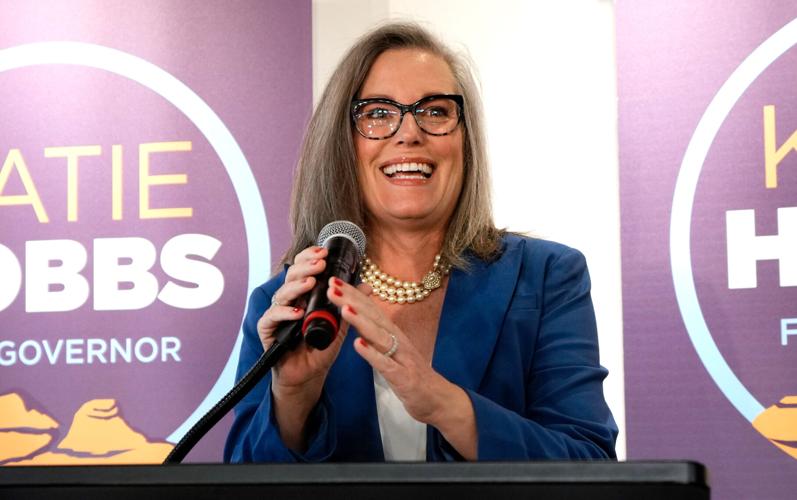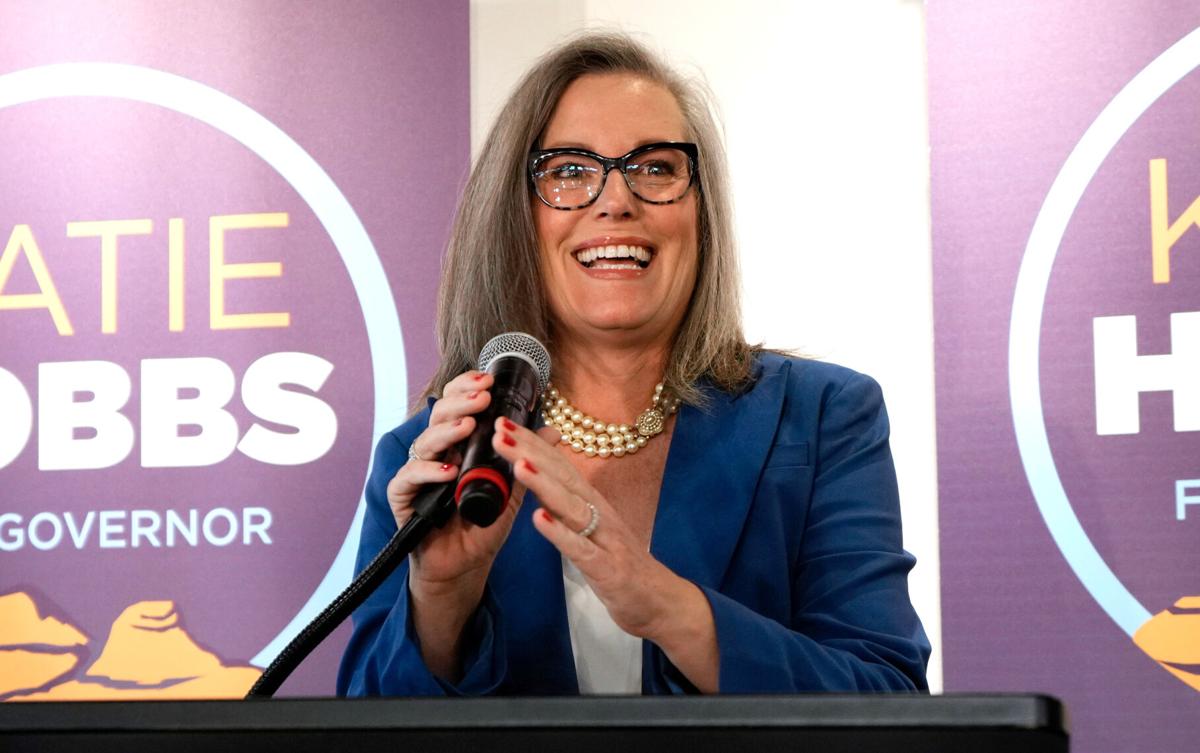PHOENIX — Governor-elect Katie Hobbs laid out her priorities for the next four years, promising to work with the Republican-controlled Legislature to solve problems — but with a political warning to those who choose a different path.
“Republicans and Democrats will have an open door to my office so we can get to work, find bipartisan compromise and deliver for the people of Arizona,’’ Hobbs said in a victory speech Tuesday to supporters.
Hobbs will be the first Democrat to be the state’s chief executive since early 2009 when Janet Napolitano, who also faced having to deal with Republicans running the Arizona House and Senate, left to take a cabinet post in the Obama administration.
Hobbs ticked off issues she said need to be addressed, including providing more funding for public education, modernizing the state’s water supply through better conservation, creating more economic opportunities and providing resources for border communities to deal with immigration.
“We must work together to solve our urgent problems,’’ she said.
“But for those of you who prefer to obstruct, spread misinformation and continue to pursue an extreme agenda out of touch with this state, take note of the results of this election,’’ Hobbs said.
Those results include not only her victory over Republican Kari Lake but also the victories of Democrats Adrian Fontes for secretary of state and Mark Kelly for U.S. Senate against foes who, like Lake, chose to dwell on baseless claims the presidential election two years ago was stolen from Donald Trump. The races for state attorney general and schools chief remained too close to call Tuesday.
“Voters sent us a loud and clear message,’’ Hobbs said. “They rejected the chaos because we have urgent problems. And they need and expect all of us to deliver.’’
The biggest cheer came when Hobbs, currently Arizona’s secretary of state, vowed to work to repeal the state law that outlaws all abortions except in cases where the mother’s life is in danger.
That law, which dates to 1864, became enforceable again according to Republican Attorney General Mark Brnovich when the U.S. Supreme Court earlier this year overturned the historic 1973 Roe v. Wade decision, which said women have a constitutional right to terminate a pregnancy prior to a fetus being viable, somewhere between 22 and 24 weeks. But enforcement of the Arizona law is on hold while the state Court of Appeals considers whether it was superseded earlier this year when lawmakers approved a ban on abortions after 15 weeks.
“I will use every tool at my disposal to restore the reproductive rights that have been guaranteed for the last 50 years,’’ Hobbs said. “A woman’s medical decision should be between her and her doctor.’’
Whether courts, or lawmakers, will go along is unclear.
Aside from the pending appellate court review, voters ousted Republican Sen. Nancy Barto of Phoenix, who has been the legislative sponsor of many abortion restrictions crafted by the Center for Arizona Policy. Replacing her is Democratic Sen. Christine Marsh. The two, both incumbents, were pitted against each other after redistricting.
Abortion issues aside, Hobbs also may find herself taking a page from Napolitano’s playbook in dealing with a Republican Legislature. Napolitano holds the record for the most vetoes by an Arizona governor in any session: 58 in 2005 — nearly one out of every seven bills that were sent to her that year.
Analysts: Lake rejected moderates
Hobbs is not alone in her assessment that voters, in choosing her over Lake, delivered a message of wanting cooperation rather than confrontation.

Kari Lake, Arizona Republican candidate for governor, gets ready to answer questions from the media after voting on Election Day in Phoenix.
Lake’s sole comment about the election results was a tweet that “Arizonans know B.S. when they see it.’’ She did not respond to requests to discuss whether she will challenge the results based on her complaints that some Maricopa County residents didn’t get to vote because of problems with printers and tabulation equipment at some voting centers.
But several political analysts told Capitol Media Services that Lake turned off some voters, such as when she told moderate Republicans — the folks who supported the late John McCain — they are not wanted.
“We drove a stake through the heart of the McCain machine,’’ Lake said in September, days after beating Karrin Taylor Robson, the pick of incumbent Gov. Doug Ducey, in the Republican primary.
And at one point during the general election campaign, Lake asked the audience whether there were “any McCain Republicans in here.’’
“Get the hell out,’’ Lake said.
“There is a stark difference between the Doug Ducey model and the MAGA model’’ of the GOP, said pollster Mike Noble putting Ducey in the same political and ideological camp as McCain.
“The MAGA model, they’ve proven they can win primaries,’’ Noble said. “But this, again, is another perfect example of them not being able to win the all-important general election due to their positions and their coalition of support.’’
Noble called comments by Lake and her supporters that they don’t want or need those from the McCain branch of the party “just unnecessary’’ — and counterproductive.
The numbers would seem to reflect that: Nearly 33,000 people who bothered to fill out an early ballot or go to a polling place on Election Day chose to skip the governor’s race.
That number is significant because, as of late Tuesday, Hobbs was up by fewer than 20,000 votes. Noble said it’s too early to tell whether these were Republicans or independents who, for whatever reason, would not support Hobbs but felt they could not vote for Lake.
‘Dragging around’ 2020
Consultant Stan Barnes, a former Republican legislator, said antipathy toward Lake by some Republicans showed up in other ways.
He pointed out that Rachel Mitchell, running for Maricopa County attorney, got 24,000 more votes in the county than did Lake.
“Kari Lake underperformed because there is a voter, registered Republican, that did not want to reward that particular behavior,’’ Barnes said.
He said it didn’t have to be that way.
Barnes called Lake “the best candidate in a generation,’’ calling her at one point the most “charismatic politician that I have seen in decades.’’ It was that “super power,’’ he said, that helped her defeat Robson, who had vastly outspent her in the primary.
But the path she chose precluded a path to victory.
“Kari Lake, with all her skill and connectivity, cannot sustain a statewide election while dragging around the 2020 ‘stolen election’ bag of rhetoric,’’ Barnes said. “The voters of Arizona have decided to put that in their rear-view mirror and move forward.’’
Consultant Chuck Coughlin said that, in many ways, the election wasn’t a race about Hobbs and what she stood for but instead was about Lake.
“In my view, Arizona electors rejected her because of her extremism and her election denialism,’’ he said.
“That very passion, that very charisma that drew a lot of voters to her also repelled a lot of voters away from her,’’ Coughlin continued. “And she failed to recognize that politics is the art of addition and not subtraction.’’
He agreed that some of Lake’s comments, like telling McCain supporters to get out, “frightened a lot of people.’’
“They alienated a good portion of the electorate,’’ Coughlin said, including many Republicans.
Consider, he said, the “steady’’ successful reelection campaign of Republican Kimberly Yee for state treasurer. She racked up more than 1.37 million votes.
“That seems to be the ceiling that should have been available to Lake,’’ Coughlin said. Instead, the latest numbers showed Lake with about 120,000 fewer votes.
“She made such an issue of her ideological extremism that she repelled people away from her,’’ he said. “She didn’t attract people.’’
Party chair under fire
The defeat of Lake and the losses by Trump-supporting “Make America Great Again” Republicans in other races, including secretary of state and U.S. Senate, could have a ripple effect on party leadership.
Robson on Tuesday called for Kelli Ward, who is the state’s Republican party chair — and has been heavily involved in unfounded claims the 2020 election was stolen from Trump — to resign.
She said Arizonans voted for Trump in 2016 and had a Republican governor and both of the state’s Senate seats. But Robson said not only did Arizona go for Joe Biden in 2020 but, with this year’s election, the governor and both senators will be Democrats, something that hasn’t happened since the 1950s.
There was no immediate response from Ward.
Election officials assured voters that every ballot would be counted after a printing malfunction at about one-quarter of the polling places across Arizona's most populous county slowed down voting. The snag fueled conspiracy theories about the integrity of the vote in the tightly contested state. Some high-profile Republicans tried to make the case that Democrats were seeking to subvert the vote of Republicans, who tend to show up in greater numbers in person on Election Day. Officials say about 17,000 ballots in Maricopa County, or about 7% of total dropped off Tuesday. The problem slowed down voting in both traditionally Democratic and Republican areas. At one location, some voters there reported waiting several hours to be able to vote.






